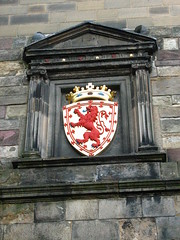Medieval Times

IMG_6777.JPG
Originally uploaded by Jon Lo.
Living in Edinburgh makes me forget which century I am in and ponder what life might have been like long ago. The castles, the closes, the cobblestone roads evince the glory of generations past. The statues of former heroes scattered throughout bear witness to both the city's anitquity and its ancient renown.
I am, at the present, pursuing an academic career at the University in this old town--but what would I be doing here, say, eight hundred years before? Some suspension of disbelief is required, of course, since it is rather unlikely that a single Chinese person would be found anywhere near Scotland in the 13th century. In any case, I have calculated that I would either be 1) a blacksmith, 2) a friar, or 3) a thief. These professions were derived from a complicated process which involved thinking about what skills I have and how I might best put them to use in the 1200's.
Blacksmith-
Presently, I spend around 12 hours a week sitting in front of a grindstone sharpening blades. Granted, these are blades of ice skating patrons, but the crossover to ye olde daggers and swords does not seem too difficult a task. I will have these cards on which you can get a stamp for each blade sharpening, and when you have collected ten stamps you will be entitled to ONE free blade sharpening(!). I will also offer excellent discounts for groups of invaders/defenders with a party of 30 or more .
Friar-
I have more theological information and biblical knowledge than any regular person could hope to wave a stick at. I would be the town's religious know-it-all and be on hand to baptize babies and say prayers for dying people. I can give definitive answers to questions about damnation and who can marry whom. If I were to take this task seriously, however, I would need to get going on learning LATIN. Maybe I should just be a...
Thief-
My powers of deception, my sleight-of-hand and misdirection, might very possibly render me a very skillful...pickpocket. I reckon I could make quite a living out of swindling other people. I mean, why work when you can just steal what you need? I suppose one downside to this line of work is what happens to you should you be caught. Consider, for instance, the following punishment prescribed by Richard the 1st in 1191 :
"Concerning the lawes and ordinances appointed by King Richard for his navie the forme thereof was this… item, a thiefe or felon that hath stolen, being lawfully convicted, shal have his head shorne, and boyling pitch poured upon his head, and feathers or downe strawed upon the same whereby he may be knowen, and so at the first landing-place they shall come to, there to be cast up" (Transcript of original statute in Hakluyt's Voyages, ii. 21)
Tarring and feathering was not a lenient form of punishment:
"In a typical tar-and-feathers attack, the subject of a crowd's anger would be stripped to the waist (if not below). Hot tar was either poured or painted onto the person while he (rarely she) was immobilized. Then the victim either had feathers thrown on him or was rolled around on a pile of feathers so that they stuck to the sticky tar... First degree burns are sustained after a split second contact with a material that is about 70 °C (160 °F). The same is also sustained after thirty seconds of contact with 55 °C (130 °F) material. The tar of that period was of such a quality that it only melted at about 60 °C (140 °F). At temperatures of 60 °C (140 °F) burns can be created with a three second contact. The thin tar layer presumably cooled quickly; nevertheless, the victims possibly sustained some burns in addition to their humiliation." (Wikipedia Entry)
Ouch. Um. On second thoughts I think I will just stick to (haha) the 21st century for now until I can procure a more diachronically profitable set of skills.
Back to work...

2 Comments:
You have quite the imagination Mr. Lo... I'm glad we don't live in Medieval times either.
8:19 PM
hehe jonathan you are so silly. that was a fun read.
5:04 PM
Post a Comment
<< Home